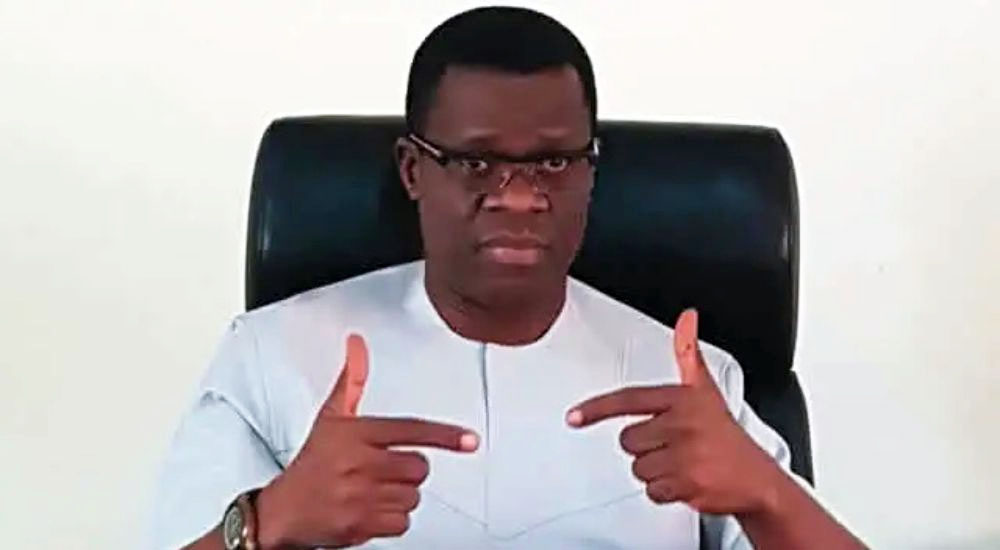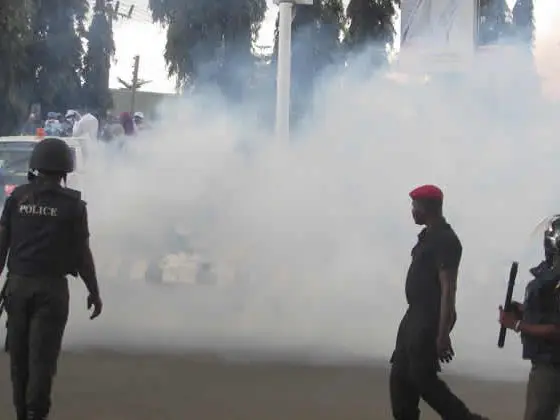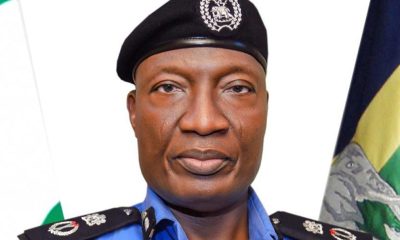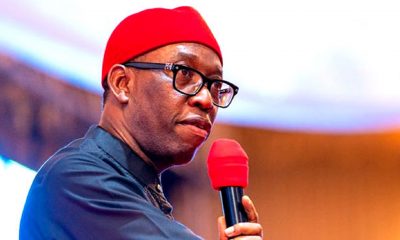News
Nigeria needs new Constitution, not amendment – Okowa

Delta Governor Dr. Ifeanyi Okowa, on Wednesday, said Nigeria needed a new Constitution, not an amendment to accommodate emerging issues of good governance and greater interest of Nigerians.
Okowa stated this when he received on a courtesy visit, the Senate Sub-Committee on review of the 1999 Constitution led by Senator James Manager at Government House, Asaba.
He said that a new Constitution for the country had become imperative in view of observed lacunas in the 1999 Constitution and called for the insertion of a clause to allow for the re-writing of the Constitution while it would continue to be in operation until a new one was ready.
“There is no doubt that there is still a lot to work on in our Constitution to have a near-perfect document, and I know that the National Assembly has continued over time, to cause some of the amendments to be.
“I thank God that those sent here are familiar with the zone; so, when the people truly speak they would understand.
“But, I also wished that some persons from other zones actually had the opportunity to come down here to hear the voices of our people directly because sometimes we do not understand the extent of the pains that people of the Niger Delta truly suffer in our nation.
“We believe in one Federation; we believe in the unity of Nigeria, but we will continue to ask for very strong equity in our Federation as a people and I know that the people will really voice out their opinion at the public hearing.
“We know that some amendments were made recently but on a general note, we are also aware that the Constitution itself appears to have just been hurriedly put up just before the 1999 elections and handed over.
“I wished it was possible to start the whole process again and to re-write the Constitution and also believe that there may be a need for us to look very closely on ways and means of re-writing the Constitution as a new document even when the current Constitution exists,’’ Okowa said.
He recalled that the process of reviewing the 1999 Constitution started in the 7th Assembly, but that it was not possible to push it forward because of certain disagreements at that time.
Reiterating the necessity of a new constitution for the country, he said “if we look deeply as lawmakers we would be able to create a window for that purpose because every year or in every assembly, we continue to engage ourselves in one amendment or the other.
“I think that it is possible to insert a clause that will enable us to truly rewrite the constitution while the current constitution may be operational until the new one is brought into force.
“In that case, we would not be struggling year-in-year-out trying to amend one clause or the other because there are challenges when it comes to that.’’
The governor urged the National Assembly to look into power devolution to the states, review of revenue allocation formula, oil derivation and state police in the amendment to enable Chairman of Revenue Mobilisation Allocation and Fiscal Commission to lay revenue allocation formula proposals directly before the lawmakers.
“As a state, we believe that the way the federal structure is in terms of governance, the powers at the federal level or what you call the powers of the Presidency are too weighted against the rest of the structures in the state or what you call the sub-national governments.
“We believe that the exclusive list ought not to be as it is, because there are many things in that place that could truly be in the concurrent list.
“This is because the sub-national governments are much closer to the people and understand truly the pains and needs of their people and they are more likely to affect development changes that will be impactful on their people,” he stated.
He regretted that no review had been made to the revenue allocation formula for the past 24 years whereas it was supposed to be reviewed every five years.
Okowa said that oil-producing states had continued to struggle for the 13 percent derivation fund, and remarked that oil was a wasting asset while the environment where it was being extracted had continued to be polluted and degraded.
“The 13 percent is actually too low and we believe it should be reviewed to 50 percent as it used to be in the past or allow the states to own the assets and pay tax to the centre as applicable in other climes.
“We are also fully aware that our country is going through tough times with the current insecurity pervading our nation.
“We believe in the Nigerian Police but to fully secure the land there is a need for states to have their own police and all the governors of this nation are in support of that.
“The Nigerian police have been stretched beyond the limit and to complement the Federal Police Force there is a need for the states to have their own police,” he added.
He assured the Committee of the support of the state when recommendations were made from the National Assembly.
“We are glad that you have come to listen to the people and we hope that when you also speak within the larger Committee that those voices which do not understand the pains of our people will not suppress the voices of our people.
“It is in the interest of the country that we provide more funds for the development of oil-producing states and for them to take care of the degradation of their environment,” the governor stated.
Earlier, Senator Manager had said that the Committee which comprised Senators from Edo, Bayelsa, and Delta was in the state to conduct a two-day public hearing on the amendment of the 1999 Constitution.
He said that aside from the Spiritual Books, the Constitution was the most important book for any country.
Manager restated that Southern Senators had endorsed all the resolutions made by the Southern Governors in the “Asaba Declaration’’ of May 11.
“The amendment of the Constitution is not what can be done by the National Assembly alone, but it involves states’ Houses of Assembly and other stakeholders.
“The document is never a perfect one; therefore, amendments are inevitable from time to time and in tune with current realities.
“The public hearing will afford the Committee the opportunity to hear from the people and collate their views for onward processing by the Senate,” he stated.
News
Saudi Arabia Confirms Sighting of Ramadan Crescent, Fasting Begins Wednesday

Saudi Arabia Confirms Sighting of Ramadan Crescent, Fasting Begins Wednesday
Riyadh, February 17, 2026 — Authorities in Saudi Arabia have officially confirmed the sighting of the crescent moon marking the beginning of the holy month of Ramadan, signaling that fasting will commence on Wednesday, February 18, 2026.
The announcement was made Tuesday evening following reports from moon-sighting committees across the Kingdom. In a statement carried by state media, the Supreme Court confirmed that verified testimonies of the crescent’s sighting had been received after sunset on the 29th day of Sha’ban.
With the confirmation, Muslims throughout the Kingdom will begin the first fast of Ramadan at dawn on Wednesday.
READ ALSO:
- Deadlock at National Assembly as House Snubs Electoral Act Bill Meeting on E-Transmission Clause
- Maikori Accuses Ex‑Governor El‑Rufai of Persecution Over 2017 Tweet
- Shari’ah Council Defends Kwankwaso, Rejects US “Christian Genocide” Claims
Religious authorities had earlier called on citizens and residents to look for the crescent on Tuesday evening and report any confirmed sightings to the nearest court. Observations were conducted in various regions, including areas around Riyadh and Mecca, as part of the Kingdom’s longstanding tradition of physical moon sighting.
Ramadan, the ninth month of the Islamic lunar calendar, is observed by Muslims worldwide as a period of fasting, prayer, charity, and spiritual reflection. The start of the month is determined by the sighting of the new crescent moon, in accordance with Islamic tradition.
Several other countries in the Gulf region are also expected to begin fasting on Wednesday following similar confirmations, while some nations may rely on local moon sightings to determine their own start date.
Further announcements regarding the duration of nightly Taraweeh prayers and official Ramadan working hours are expected from relevant authorities in the coming days.
Saudi Arabia Confirms Sighting of Ramadan Crescent, Fasting Begins Wednesday
News
Former INEC REC Warns of “Chaos” in 2027 Over E-Transmission of Election Results

Former INEC REC Warns of “Chaos” in 2027 Over E-Transmission of Election Results
A former Resident Electoral Commissioner (REC) of the Independent National Electoral Commission (INEC), Mike Igini, has raised concerns that Nigeria’s ongoing debate over electronic transmission of election results exposes unresolved legal, institutional, and technological challenges, despite years of electoral reforms. Speaking on Channels Television’s Politics Today on Monday, Igini warned that recent Senate amendments to the Electoral Act could create confusion and vulnerabilities in future elections, particularly the 2027 general polls. He stressed that failing to clarify rules on electronic results transmission risks undermining democracy, transparency, and public confidence.
The controversy stems from the Senate’s recent amendment to the Electoral Act, which now allows electronic transmission of results but removed the “real-time” requirement that had previously been proposed to enable direct uploading from polling units to the INEC Result Viewing Portal (IREV). Under the amendment, Form EC8A, the physical result sheet, remains the primary document in cases of internet outages or connectivity failure. Igini cautioned that this creates a grey area that could trigger disputes in 2027 if presiding officers are allowed discretion over network availability, highlighting that legal and technological clarity is essential to avoid chaos.
READ ALSO:
- DHQ Confirms 100 US Military Personnel Arrive in Bauchi for Counter-Terrorism Training
- Dokpesi Jr, Ex-GMD Akiotu Clash Over DAAR Communications Mgt Restructuring
- EFCC Holds El-Rufai Overnight Over ₦423bn Kaduna Corruption Allegations
Referencing a 2021 technical report by INEC and the Nigerian Communications Commission (NCC), Igini said Nigeria possesses adequate telecommunications coverage, with 2G and 3G networks covering about 93% of the country, making electronic transmission feasible nationwide. INEC had also mapped polling units to mobile network operators and prepared SIM cards and data arrangements to ensure smooth uploads to IREV. He explained that Nigeria had previously relied on interim innovations, including biometric voter registers, card readers, and digital result-viewing platforms, to enhance transparency where legal provisions prohibited full electronic transmission.
Igini further warned that introducing discretionary fallbacks for “network issues” could reintroduce vulnerabilities, as presiding officers might abuse their authority to manipulate results. He emphasised that modern election devices, such as BIVAS machines, can operate both online and offline, uploading results at the nearest connectivity point to ensure integrity in IREV. “The whole purpose of IREV is to make results verifiable and immutable once entered. Allowing manual override defeats the reforms we have painstakingly implemented over the years,” he said.
He also noted that judicial interpretations and evolving legislative amendments have contributed to uncertainty over the legality of technological innovations in elections. Igini urged lawmakers to consider the long-term implications of changes to the Electoral Act, stressing that Nigeria’s democratic stability relies on cooperation between INEC, the judiciary, and key stakeholders. “Our democracy’s future depends on the rule of law. Without it, society risks being dominated by those who act for personal interest rather than public good,” he added.
With the 2027 elections approaching, Igini’s warnings underscore the need for clear legal frameworks, technological preparedness, and robust institutional coordination. He urged all stakeholders to work collaboratively to ensure that electronic transmission of results enhances transparency, accountability, and credibility in Nigeria’s electoral process.
Former INEC REC Warns of “Chaos” in 2027 Over E-Transmission of Election Results
News
Teargas, Chaos at EFCC as El-Rufai’s Supporters Clash with Security Operatives

Teargas, Chaos at EFCC as El-Rufai’s Supporters Clash with Security Operatives
Tension gripped Abuja on Monday as security operatives fired teargas to disperse protesters and supporters of former Kaduna State Governor, Nasir El-Rufai, during a confrontation at the headquarters of the Economic and Financial Crimes Commission (EFCC).
The standoff reportedly occurred when hundreds of El-Rufai’s supporters accompanied him to the anti-graft agency’s headquarters, escalating an already charged political atmosphere in the Federal Capital Territory.
Eyewitness accounts and video footage circulating online showed security personnel deploying teargas canisters as crowds surged toward the EFCC complex.
In one of the videos, agitated voices were heard declaring, “We will come back; when it clears, we will come back,” suggesting the group’s resolve to sustain their protest despite the crackdown.
READ ALSO:
- NSCIA Secretary-General Clarifies Council Receives No Government Funding
- Saudi Supreme Court Calls on Muslims to Sight Ramadan Crescent Moon on Tuesday Evening
- Nigeria Tax Act 2025: FG Clarifies No New Construction or Bank Taxes
The development follows reports last Thursday that El-Rufai was allegedly stopped by security operatives at the Nnamdi Azikiwe International Airport, Abuja, in what his supporters described as an attempted arrest.
While official details surrounding the airport incident remain unclear, the situation appeared to have heightened tensions among his loyalists.
El-Rufai, who served as governor of Kaduna State from 2015 to 2023, remains a prominent political figure and a key voice within Nigeria’s political landscape.
His tenure was marked by sweeping reforms as well as controversy over security challenges and policy decisions in the state.
As of press time, the EFCC had yet to issue an official statement clarifying the circumstances surrounding Monday’s confrontation or addressing reports of any investigation involving the former governor.
Security presence around the commission’s headquarters was significantly reinforced following the clash, with access to parts of the area temporarily restricted.
The incident adds to growing political tensions in the country, particularly as anti-corruption investigations continue to intersect with high-profile political actors.
Teargas, Chaos at EFCC as El-Rufai’s Supporters Clash with Security Operatives
-

 Education2 days ago
Education2 days agoCheck Your Name: UNILORIN Releases Updated NELFUND Refund List for 2024/2025 Students
-

 News2 days ago
News2 days agoOsogbo Sons and Daughters Mark 5th Anniversary with Awards, Political Undertones
-

 metro1 day ago
metro1 day agoUS Freezes Assets of Eight Nigerians Over Boko Haram, ISIL, Cybercrime Links
-

 News2 days ago
News2 days agoAfenifere Calls for Immediate Take-Off of State Police as Terror Threats Rise in Yorubaland
-

 News3 hours ago
News3 hours agoSaudi Arabia Confirms Sighting of Ramadan Crescent, Fasting Begins Wednesday
-

 metro1 day ago
metro1 day agoTerror in Lagos Traffic: Cutlass Gang Unleashes Mayhem on Mile 12–Ketu Road
-

 Entertainment1 day ago
Entertainment1 day agoMystery in Lekki: Police Probe Death of Two Nollywood Crew Found Lifeless in Parked Car
-

 metro2 days ago
metro2 days agoUS Military Boosts Support for Nigeria’s Fight Against Insurgency With Ammunition, Troop















